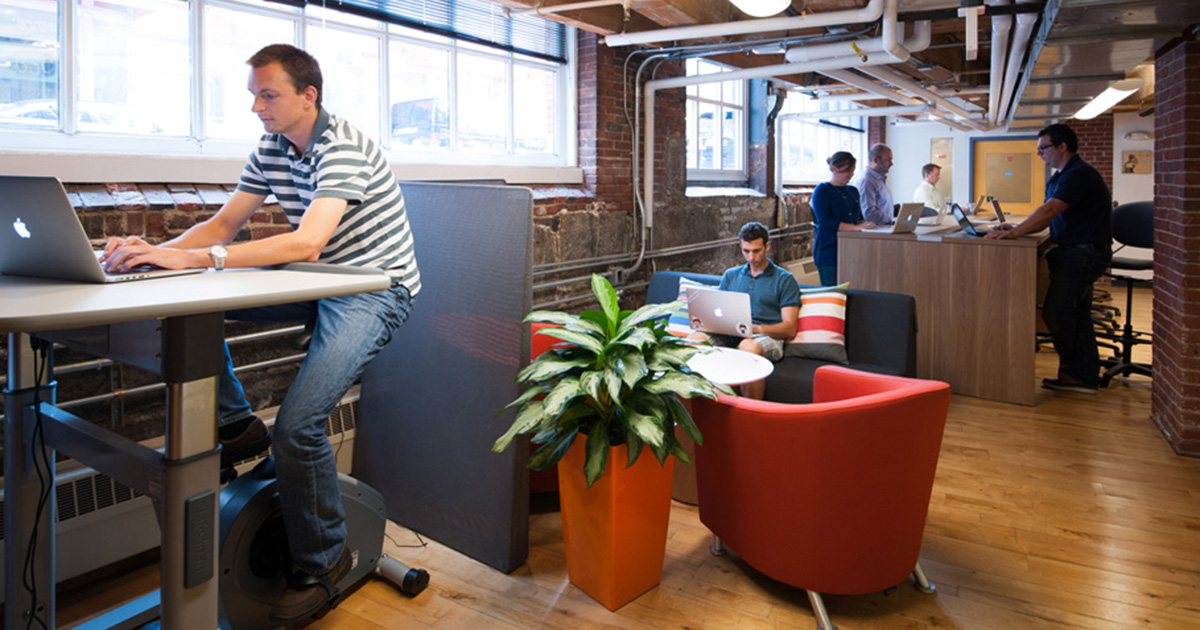Need Space for Your Startup? Consider Co-working

How do you improve an already world-renowned startup accelerator?
In the case of the Summer Venture Program at Babson College, the answer to that question was just 15 miles away in Boston.
When Debi Kleiman, executive director of Babson’s Arthur M. Blank Center for Entrepreneurship, pushed to move the program to Boston for 2017, she knew the students in the accelerator would benefit from the city’s thriving entrepreneurial community.
But, to move the program meant finding the right physical space to operate out of; choosing a location that fostered collaboration, community, and connection. And, for Summer Venture Program, that meant a co-working space.
This year’s program operated out of Workbar Boston, a co-working space for teams, entrepreneurs, and mobile professionals. It’s one of more than 30 such spaces in the Hub, and part of a national trend that may result in more than 1 million people working in co-working spaces by the end of 2017.
To get an idea of why co-working is a good fit for entrepreneurs, we talked with members of this year’s Summer Venture Program and the Workbar team.
Office Space
On a basic level, co-working spaces provide entrepreneurs with something that can feel unattainable during the early stages of building a business: affordable office space.
“Co-working can be much more cost effective [than a private office],” said Cheryl Centeno, senior space and community manager at Workbar Boston. Workbar’s mix of membership options enables entrepreneurs to choose a plan that fits their unique needs, be it a full-time home base or a periodic workplace. Even better: everything is monthly, so members aren’t locked into long-term leases. “The flexibility of our memberships is key, especially for startups still trying to figure out their footing.”
Another benefit: not having to worry about office logistics.
“Co-working spaces take care of all the little details in running a business: the water, the electricity, your mail, meeting rooms, even coffee,” said Antonette Ho, assistant director of entrepreneur programs at Babson College’s Arthur M. Blank Center of Entrepreneurship. “Having these utilities looked after allows entrepreneurs to spend more time on growing their businesses.”
That’s a big deal for Yulkendy Valdez and Josuel Plasencia, co-founders of Project 99 and 2017 graduates of Babson. Both are participating in this year’s Summer Venture Program and, until recently, they’d been working out of dorm rooms and coffee shops. The program’s migration to Boston and Workbar has provided a welcome change for the pair.
“I’m getting Google-like office perks,” said Valdez of her summer at Workbar. “Everything is set and laid out, which makes me feel less stressed. Much different than a coffee shop.”
Connections
But co-working spaces are more than just snack-filled places to report to each day.
“At Workbar, the community is just as much a value—if not more—than the space itself,” said Centeno. “Our members are from all different industries and companies. Some are remote workers, some are small business owners, some are entrepreneurs. It’s a really diverse environment.”
The result of that diversity: serendipitous meetings that could translate to connections and long-term partnerships. The person sitting next to you, or the one you meet at a community networking event, could become your legal counsel, your app developer, or a source of sage advice down the line.
“It’s shocking how often founders will bump into people who can help in unforeseen ways,” said David Chang, director of the Summer Venture Program. “On a recent day, I bumped into three different people—a journalist, an investor, a potential customer—in a span of 15 minutes.”
Centeno has seen these connections blossom into collaborations among members. One example: Larry Yu of Kite Global Advisors and Mary Adams of Smarter-Companies, both consultants, joined forces to produce a series of talks on Conscious Capitalism in Boston.
And, with Workbar, entrepreneurs who haven’t made the right connection in house can turn to a digital member community or an extensive member perks program that offers discounts at General Assembly, Squarespace, Boston Sports Clubs, Zipcar, and more.
Community
At the heart of it all—and one of co-working’s biggest benefits—is a sense of community and comradery that form almost immediately for those using the space.
“There’s a special energy once you walk through the doors of a co-working space,” said Plasencia. “That energy is really redefining what it means to be in an office.”
It’s one of the reasons Kleiman pushed to move the Summer Venture Program to Boston this year. “Entrepreneurship can be kind of lonely. There’s so much you can learn from being around other entrepreneurs. That community aspect is part of our [Summer Venture Program’s] secret sauce, and moving to Workbar made it even stronger.”
And, when you’re surrounded by a community of entrepreneurs, you may just find yourself even more motivated to move your venture forward.
“Being around peers that are also going through an entrepreneurial journey can be motivating,” said Ho. “You want to work harder and faster when you’re in an environment with like-minded individuals.”
Featured Photo: Tiffany Knight
Posted in Entrepreneurial Leadership





